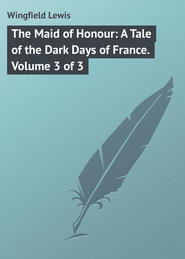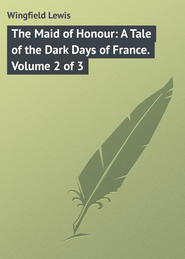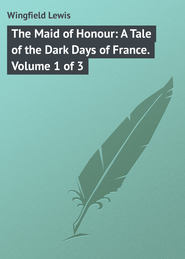По всем вопросам обращайтесь на: info@litportal.ru
(©) 2003-2024.
✖
My Lords of Strogue. Volume 2 of 3
Настройки чтения
Размер шрифта
Высота строк
Поля
Why? Because she was a collough and he a farrier; or, if he wasn't, why should he wield a firing-iron? Colloughs have always hated farriers, time out of mind, because they are rival practitioners in the art of medicine, and the colloughs nourish a vague belief that, in the days of the Bound Towers, the herbalists were lady-doctors, and that they enjoyed an undisputed sway over both kine and gentlefolk until Crummell introduced the veterinary as a special branch of Æsculapian science.
He tried to ingratiate himself with the old dame by playing Peter to her Nurse; but she scorned to be so wheedled, remarking curtly, when he was particularly civil:
'The curse of Crummell light on yez, breed, seed, and branch, ye villainous cow-doctor. The Lord planted our cures in the fields before there was no 'pothecaries.'
Which remark being usually irrelevant, not to say incomprehensible, he met it by a good-tempered nod, which brought the irate lady to the extreme of patience.
The days dragged on thus but slowly. Madam Gillin was a strange mixture of bravery and pusillanimity. As we have seen, she stood in terror of a particular gentleman, because he had discovered that she took her Protestant child to mass, and had threatened to expose the awful secret. Such a matter would disturb no one at the present day; but at that time it was a heinous sin, which would have pointed the sinner out for some practical joking on the part of the Protestant squireens. At the same time she fearlessly harboured one who was a marked man, upon whose head shortly a price might be set, who might drag her with him to ruin, if the worst came to the worst; and all because she had sworn an oath once to a dying paramour, and had watched, with anger mingled with sorrow, the career of the child she had promised to protect.
Knowing Ireland's wrongs better than he did, and learning from hearsay how proud-stomached a boy he was, she had always dreaded that which actually came to pass. She and Curran agreed that it would be deplorable if he joined the popular party; but as both secretly leaned in that direction, they could not discountenance him for having the courage to maintain, in face of danger, what they felt to be the rightful cause. For all their sakes, however, she acted with feminine tact. She kept him a close prisoner in a garret while it was day, sitting alone herself in the garden during fine weather, where all who passed along the high-road might perceive a strange figure they were little likely to forget. At night she took him out under personal escort to take the air, bidding Phil march forty yards in front and whistle at the first hint of danger, while Norah fulfilled the same office behind; Jug meanwhile being strictly enjoined to allow no strange foot to cross the threshold, under any pretence whatever.
In the course of these walks they wandered by the shore, coming quite accidentally, sometimes, upon a group of fishermen, who bowed to the young man with respect, and conversed with him in long and earnest whispers. It transpired by-and-by that some of the ubiquitous informers were beginning to turn their attention to the rage for fishing which seemed to have arisen about Strogue Point. Then Madam Gillin forbade even the solace of these nocturnal wanderings.
It became known that many of the marked ones were journeying to and fro, in a suspicious and mysterious manner, between Wexford and Dublin and the adjacent districts. It also became a matter of public scandal that the object of the journeys was to commune with a personage of rank, the only one who dared to prefer his country to his class. Unwise conspirators began to babble of a lordling who would shortly lead them to certain victory-who, English though he might be by lineage, did not forget how many centuries of sojourn bound his family to the sister island. They spoke with gratitude and pride of this rara avis, all the more incautiously, perhaps, because they knew him to be safely hidden beyond the ken of Sirr and of his bloodhounds.
Now as week followed week, and month glided after month, it chanced that my Lord Clare departed to the bath of Harrogate to drink the waters for his health. By a singular coincidence, Mr. Pitt also travelled thitherward. It was, of course, a coincidence; but folks did say-well, no matter what they said.
When Lord Clare returned to the Irish metropolis, he discovered, with concern, that the secret committee of Lords-the Wehmgericht who still performed in the shadow unholy and illegal deeds-had requested the Viceroy to issue a certain warrant.
Lord Camden, rather pleased for once to act upon his separate account, mumbled that the lords were quite right to keep their own nest clean; that it was shocking to think that one of their body should so fearfully misbehave himself. He went further. Other younger sons of an adventurous turn might follow this pernicious example. Not only must he be taken forthwith, but must also be made an example of. His brother might object possibly-that nice loyal young nobleman, who had assisted in building many Martello towers; but his outcry, should he presume to make one, must be stopped by timely courtesy. The Glandores of Strogue were earls; why should they not be created marquises?
So my Lord Camden delivered the warrant, which had for long been lying in his escritoire, to Major Sirr, and offered, as well, a reward of a thousand guineas for the culprit, alive or dead.
Quite a tremor went through both Houses. One of the nobles! This was serious. A few thousand peasants, more or less, mattered to nobody; but it was a pity to touch the noblesse. Then they talked of Lafayette, who was a marquis, whilst this was only an earl's younger son, and soon felt quite comfortable; even applauded the Viceroy's timely severity.
Lord Clare was more troubled, when he learned these things, than his enemies would have deemed possible. He wrote to his dear old friend at Glas-aitch-é, bidding her not grieve too much. It was done in his absence. He dared not openly interfere in favour of her misguided son, but would make a personal request to Mr. Pitt to urge his Majesty to clemency. He had done much work for Mr. Pitt (forgetting to state how dirty that work was); and no doubt his boon would be granted. If not, still must his loving mother not despair. Prison bars might be sawn; turnkeys were very shortsighted. There were boats about, and men to man them.
He never doubted for a moment that the reward would be claimed. How blind both Curran and his protégé had been not to guess his transparent riddle! My lady wrote back in course of time, deploring, in bitter terms, the blow which had befallen the family; the dart which had transfixed her heart. And my Lord Clare was no little amazed to perceive, or to seem to perceive, that my lady took her anguish calmly. Either she was a Stoic, or more unfeeling as to her offspring than he liked to consider a lady to be who was also his old friend.
Thus did events unroll themselves, till one fine day a party of yeomanry, more intoxicated even than they usually were, took it into their wise heads to investigate the Little House. Happily the chatelaine was at home to defend her penates, whilst old Jug shrieked maledictions on the party like a frantic Chorus. Madam Gillin stoutly (in both senses of the word) spread her redundant charms across her entrance-stone, daring them one and all to come forward and strike a woman. She threatened them-Catholic though she was-with the vengeance of the Bar. Was she not the chosen ally of my Lords Clonmell and Carleton-those gay and festive judges-who held her company and her wine in such deservedly high esteem? Did not even the gradually saddening attorney-general-Mr. Arthur Wolfe-count her among his friends? Woe be to the military gentlemen who should outrage her sacred hearth. They might come in and do their worst, for she had naught to hide. What could she have to hide? But she warned them, in very positive language indeed, that they would rue the day they did it. They were abashed, but loath to retire, after drunken blustering, before a mere woman's tongue. Such a woman and such a tongue! Would she give the boys some drink? the captain coaxingly suggested. She pertinently retorted that if they or some of their kidney had not already destroyed the shebeen, which she had set up for the benefit of arid throats, drink might be got in plenty without stealing it from a lone woman. Yet would she even give them drink if they'd promise to be off. Not special drink, such as the judges drank, but some other, by no means despicable.
She showed the officers into the dining-parlour; produced for them a few bottles of undeniable Lafitte, bidding Norah act Hebe (who objected not at all), and ordering Jug to distribute jorums of whisky among the common men upon the lawn. It soon became an orgie. One man said something rude to Jug about her erring Biddy with the carroty poll, which sent the hag into a fury. If Biddy was sliding from the straight path, the sin must lie on her head, not her mother's. They were spalpeens, she yelled, who would rot some time-the sooner the better. When should come Judgment-day they would not awake, ne'er a recreant sowl of them, having long ago been absorbed by lean pigs that were their betters. One man bade her keep a civil tongue, or it would be the worse for her. A riot ensued, which the mistress of the dwelling hurried forth to quell. Before the officers could interfere, Madam Gillin had received a scratch upon her arm, which she exhibited in the moonlight, swearing she was 'kilt entirely,' with an accompaniment of screams from Norah, who was really terrified. The judges should hear of the outrage-my lords Clonmell and Carleton-she vociferated, and the rapscallions should be drummed out of the regiment for insulting lone women who had friends among the great. The party stole away, ashamed of the din, but Madam Gillin made capital of the incident. Bandaging her arm in bloody linen, she drove into the capital, laid a complaint there, and made believe to see a surgeon. Every day for many days she drove into town and back again, closely draped in shawls, with ensanguined bandages exposed. Long ago she perceived that if Terence was to consent to continued imprisonment, his mind must be set at rest by communication with the Directory. He chafed so in his cage that she dreaded sometimes whether he might not escape in the night while the kindly gaoleress slept. Therefore, knowing what a hue-and-cry there was after him-or rather after the unlucky thousand pounds reward-she became in some sort a conspirator herself, going daily to and fro to see her doctor, who was no other than one of the new delegates, and who thus was enabled to commune with the lordling in spite of Sirr and his battalion of watchers.
There was a lull of expectation in Dublin. Reports flew over the city-no one could tell how or whence they came-reports which set quiet citizens quivering in their beds. Hints of murder, rapine, kidnapping, explosion. Rumour swept howling over the city. The Castle would be blown into the air; it was known that the train was laid, that the match was ready. The lives of the Viceroy and his ministers were not worth a groat. What wonder if loyal yeoman souls were yet further set aflame? What wonder if the terrified senate acquiesced without murmuring at the line of action which the loyalists pursued. Soon so many prospective victims choked the alleys of the Riding-school that extra triangles had to be set up elsewhere. The Royal Exchange itself echoed with the thud of the cat; the screams of the victims for mercy could be heard in the viceregal apartments hard by. Happily for Lady Camden's peace of mind, she had fled long since. Soldiers were sent out at free quarters to the right and left, with hints that it would be well that their hosts should not forget their coming. Virgins were tossed naked in blankets, while their fathers and brothers were compelled to watch their shame. The pitch-cap was in daily use; gunpowder was exploded in the hair. A new and splendid jest was invented by a merry dog. Why not picket the recalcitrant scum? What better joke than to poise an insolent fellow barefoot upon a pointed stake? His movements would be mirth-inspiring-so grotesque and comical! The only drawback was (as experiment showed) that he fainted all too soon. No; decidedly there was nothing better than the old-fashioned lash. Men swooned under it no doubt; some died; some went raving mad. But even when these misfortunes chanced there was diversion to be had from the expectant moans of those who were awaiting a like fate. Some even lost consciousness before they were tied up at all. Such a lack of humorous perception was disgusting. Why, a rat in a pit gives sport, though his fate is predetermined. A man, though low-born, should shame to be less plucky than a rat! It was rather amusing, and salutary to a certain point in its results, to shoot down children-babes and sucklings-before their mothers' eyes. Yet no! there was so little variety in the behaviour of the mothers. They all rocked themselves and stretched their palms to heaven. It was monotonous and dull. Even the imagination of the squireens, spurred as it was by enterprising colonels, began to flag. Perhaps, after all, they were not so very much more witty or more inventive than the French in the Reign of Terror. Their superiors grew ashamed of them, forgetting that in our imperfect state there is a limit to the human intellect. They grew ashamed of their own dearth of ingenuity, being by this time so swinish and sodden with alcohol and blood-quaffing, that the English and Scotch regiments turned their backs on them, declining to associate with their Irish comrades at all, even under stress of orders and of whisky.
Winter had come again; not white this time, but red-a dusky red, by reason of the shadow of that thunderous cloud which, bloated now, was on the eve of bursting. If there is a limit set to the torturing ingenuity of fiends, so is there-by Divine ordinance-to the endurance even of slaves. A roar swept across the land-a roar of expostulation with the Most High in that He had slept too long. Sure man was not created only for the sake of torment. Children were not born merely to be ripped asunder-virgins to be ravished-men to be done to death by inches? Why, whilst the sun smiled on earth for good and bad alike-its glory heightened by a casual vapour-fleck-was Ireland alone exempted from the boon of light? The last trump had not yet sounded. Why was Erin alone to be a hell? Messengers moved like ants on the earth's surface. Something was preparing. After many delays and feints the real crisis was at hand at last. The cloud, three years ago no bigger than a hand, blackened the horizon. Even the chancellor's stony face grew wan-his nature of adamant faltered-when he surveyed the darkened heavens, hushed in an awful stillness, and waited for what might come. For a moment he trembled like Frankenstein before the monster he had fashioned.
CHAPTER XII.
DANGER
Through Madam Gillin Terence heard of these things, and was fretted beyond measure in his seclusion. The plot was ripe. Vague tales of succour were wafted from France, but the conspirators knew better now than to lean on broken reeds. They were resolved to make a frantic effort on their own account, independent of extraneous aid. Men can die but once. Death by rope or musket-ball would be preferable to such life as this-life with a brutal soldiery at free quarters in the houses; with triangles in every barrack-yard, each bearing its quivering burthen. Details had been laboriously gone into by Terence and the Wexford chiefs. The project was complete in all its details. The counties were to rise simultaneously at a given signal. The Viceroy and the members of his privy council were each to be captured in his bed. A detachment was to seize the artillery at Chapelizod; a second was to storm Kilmainham and set free the patriot leaders. It was the old plan which had always proved abortive; could it be brought to fruition now? Horses would be in waiting, so that each leader could escape and scamper off to assume the post allotted to him. The men were enthusiastic, the Wexford chiefs declared, and built great hopes on the fact of having a noble in their ranks. The only objection which Terence's anxious eye could detect was that the lower order among the priests were assuming an authority to which they were not entitled; one which, by reason of their want of education, might prove mischievous. Tone, in all his letters, had always laid stress upon this point.
'Keep the priests out of it,' he had constantly written to Miss Wolfe (Terence remembered it now). 'They will mean well, but are outrageously illiterate and given to fable, which might have a pernicious effect, their influence being enormous.'
A certain Father Roche and a Father Murphy were never weary of writing letters, suggesting changes, offering wild advice. It would be well for the Church militant to be nipped in the bud. The leaders now in Kilmainham should be warned to see to this. Councillor Crosbie would have liked more muskets and a supply of gunpowder. What a pity it was that the French attempts had failed! After all, it was perhaps better as it was. The pike was the weapon for Pat; and though many had been captured, the land was bristling with them. Cars, too, would be useful for barricades. The small farmers must be told to keep their market-cars in constant readiness. Terence's eye scanned the details. They were not to be improved. All was ready.
Nothing remained but to fix a day. New Year's Eve was suggested, in order that the year 1798 might be well begun. It was amazing and disheartening to find how impossible it was for Pat to keep a secret. A week before the old year expired, proclamations appeared on all the walls, which showed that Government was aware of what was doing. Each householder was commanded, under pain of flogging, to chalk a list on the outer door of the persons who dwelt upon his premises; with the exception (so ran the quaint document) of those who might be suffering from pecuniary embarrassment, whose names were to be transmitted privately to the Lord Mayor. He was likewise bidden to see that no one under his roof went forth into the street between nine at night and five in the morning. Could the conspirators doubt that somehow their every movement was reported?
Madam Gillin, who, strive to control herself as she would, was feverishly excited about the future, discussed the plot in all its bearings with her guest when shutters were shut and curtains drawn. It was a marvel, she declared, that his retreat had remained so long undiscovered. It was a narrow escape though, when the yeomanry arrived; but that was evidently due to accident. There was no cause to suspect treachery there. It spoke well for the country chiefs-at least the few who had been let into the secret; for a thousand pounds is a tidy nest-egg-a by no means despicable windfall. She liked those leaders whom she had seen when pretending to visit her doctor in Dublin. The best of them was a certain Mr. Bagenal Harvey-a nice gintleman-one of the few who has much personal property at stake. 'He's prudent too, for an Irishman. And so are you, my child!' she remarked, laying a plump hand affectionately on his arm. 'You've never even told your mother where you're hid. I verily believe she hates me so that, if she knew, she'd write and tell the chancellor!'
'I fear she doesn't care,' returned Terence, sadly. 'Nor does Doreen.'
The strange look of compassion flitted across the face of his hostess which he had observed there before. She muttered something which he did not catch, but he knew by the tone that it was uncomplimentary to her ladyship.
'You mustn't think ill of my lady,' he said, with an attempt at cheerfulness. 'Indeed, she so dotes on Shane that there's no room in her heart for poor me! He quite filled up that shrine before ever I came into the world. If I thought she would have been anxious, I would have informed her. But nobody cared, so I told nobody-except one.'
'You told some one! Who was that?'
'A trusty old friend of long standing-true as gold, if a little stupid-Tim Cassidy. By-the-bye, he said you didn't like him. He's good, but not clever; though I've been a little shaken of late as to the weakness of his intellect. It's wonderful how circumstances bring people out!'
Madam Gillin sat bolt upright, her fat hands clasped round her fat knees.
'You told him!' she cried aghast.
'Yes. Do not fear. He's playing a useful game, if a shady one. Each of us must do what he can, you know.'
Mrs. Gillin was so taken aback that, to conceal her emotion, she retired abruptly from the garret, and stared out of the landing-window to consider this intelligence.
'A useful game for himself,' she murmured. 'He knows-he who has wrecked them all-and has left this one here so long with a thousand pounds upon his head! What can he mean? Can he in this be sincere? No. The days of miracles are past.'
Madam Gillin had seen our friend Cassidy once without his jovial mask. It is astonishing how deceived we are in people! We may live with them on familiar terms for years, and discover at last by a gleam that their real selves are quite other from what we thought. Sometimes the gleam never comes at all. How many sons are there who never knew their mothers? How many mothers who have never known their sons-the real person with the veil withdrawn? Madam Gillin had seen Cassidy once when he was himself, and felt satisfied that he could never be true except to his own interests. Then this new position which looked the darker for the light she could throw on it, twisted itself in her mind, displaying all its facets. He knew that the young man, on whom so much depended, had been lying for weeks and weeks in ambush at the Little House. Why did he leave him there? Was he waiting for the reward to be doubled? When the moment arrived for her protégé to be taken-when he chose to speak, what would become of HER? He would surely ruin her. Could the judges save her from the penalties which would accrue from taking a Protestant under age to mass, as well as harbouring an arch-rebel?
'Well, I can't help it,' she said aloud, mentally tossing up the sponge. 'I've done what I thought right. It's difficult to see the way. He must be got out of this while there's time, and New Year's Eve so near, too! Oh that I had learnt this before!' Painful misgivings possessed her mind. 'Pray God and the Holy Mother that the poor boy may be spared!' she whispered. 'Knowing what I do, it's bitterly sorry I am for him. That proud mother of his will burn for what she's doing some time or other, though she's happy now.'
Mrs. Gillin, argus-eyed as she thought herself, could not know that the chatelaine of Strogue had already passed through a part of the travail of her punishment. She had to judge by the face, which was a mask-the face which was stony and cold enough-as cold as a face of marble.
Suddenly (as she meditated) the buxom lady saw something which caused her to crouch down and draw hastily back from the window.
'It's come!' she murmured; 'I felt it here in my heart. What a mercy that he told me, or it would have come on us unawares! Norah!' she called with caution down the stairs, 'send Phil up here this minute.' Then she sped to the garret. 'My lad,' she said quickly, 'hurry now! Get through the trap on to the roof. Phil must do the same. I'll tidy the place in a jiffy! Ye can both lie cosy in the valley of the roof.'
'What's the matter?' asked Terence, without moving.
'Matter enough. There's a party coming down the road. I'll stake my head it's Sirr or some of them. They're coming to look for you!'
'Then give them some of your Lafitte, my second mother!' laughed Terence, carelessly, 'and pack them about their business.'
'No,' Mrs. Gillin said, 'I can't explain now. They must go over the house, and be convinced that ye're not in it; and to-night we'll pack ye somewhere else for safety.'
There was no withstanding her energy. The two young men obeyed their peremptory hostess, marvelling much at her. It was Sirr, sure enough. His peculiar stoop could be recognised a mile off. Behind him were a dozen redcoats.
Mrs. Gillin was snipping dead twigs with a large pair of scissors; she wore a loose green kerchief over her turban, so unbecomingly arranged that it was evident she expected no visitors. Norah was dutifully holding a basket. How idle of the gardener to have neglected to trim those hedges! Old Jug sat crooning in the wintry sun, her eyes twinkling like beads from under a tangle of sandy elf-locks and flopping cap, her favourite dudheen between her lips.
'Misthress dear!' she croaked between two puffs of smoke, 'it's the meejor.'
But that lady was too much absorbed in gardening to hear.
'Good-day, madam,' quoth Sirr, wrinkling down his brow-tufts with a smirk, and saluting in military fashion.











